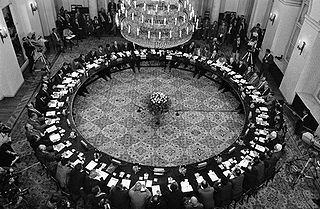Four decades after the Soviet Union held questionable elections to create a Communist Polish nation, members of the political opposition gathered with government officials in Round Table Talks on February 6, 1989. Over the next two months, those seated in the Council of Ministers Office held discussions that would expose serious cracks in the Eastern Bloc and, ultimately, signal the destruction of the Soviet Union. During World War II, Polish territory first came under the control of the German military in 1939. As the Red Army pushed back to the west from 1942 on, Soviet Premier Joseph Stalin quietly formulated plans to use Poland as a buffer zone between his country and Western democracies in Europe. In creating a group of satellite regimes taking orders from Moscow after combat ended in 1945, Stalin went back on his promise at the Yalta Conference to allow democratic elections in Poland and elsewhere. After a dubious vote to form a Communist government in 1947, the new People’s Republic of Poland came into existence in 1949 and operated as a puppet subject to the whims of the Politburo in the Soviet Union. For 35 years, the closed societies of Eastern Europe operated as a de facto world unto themselves, rejecting capitalist policies and avoiding trade with outside countries. In the mid-1980s, with Mikhail Gorbachev as General Secretary of the Communist Party in the Soviet Union, governments in the Eastern Bloc slowly opened themselves to examination by the people. With each of the member nations of the large Soviet web gradually receiving more autonomy, local representatives slowly took it upon themselves to institute greater self-determination than before. For Poland, the primary issue throughout the 1980s centered around worker’s rights. Financial mismanagement by government officials came to light at the beginning of the decade during negotiations for the Gdansk Agreement, a collaboration with striking workers at the Lenin Shipyards, giving an unsatisfied public more reason to protest than ever before. Solidarity, an underground organization of trade unions outside the Communist system, gained more and more popular support as the Polish economy bounced erratically between boom and bust, eventually counting as many as 1 in 4 people as members. Making a bid to reassert itself as the primary power base despite growing resentment, the government instituted martial law. Political protesters were quickly jailed during the 18-month crackdown, with many awaiting release for three years until a general amnesty was issued in 1986. Even with repression rampant, Solidarity continued demonstrations and strikes against the heavy-handed practices of the authoritarian Communists. During the summer of 1988, workers from a variety of industries walked off the job at one point or another. Mass transportation and the steel factories were hardest hit, giving the government little choice but to recognize Solidarity and the opposition as viable political movements. Near the end of August, Minsiter of Internal Affairs Czeslaw Kizczak met with Lech Walesa and other leaders of Solidarity in secret to propose a negotiation for the future of Poland. With inflation crushing the Polish public, officials hoped to lure Walesa and others into the party machinery to pacify them without creating real change. The Round Table Talks began on February 6, 1989 and the Communist plan quickly disintegrated. Eight weeks of discussion yielded something entirely different: first, independent trade unions like Solidarity were legalized, then a presidential office and new Senate, to work alongside the Sejm (the existing legislature), were instituted. In elections held two months after the agreement was announced on April 4th, Solidarity-backed representatives seized almost all the spots in the Senate and their full allotment of 35 percent of the Sejm. Communism in Poland was on its last legs. To historians, the importance of the Round Table Talks cannot be oversold: the sessions served as the first domino in a larger collapse of Soviet control throughout Eastern Europe. By the end of 1989, Hungary, East Germany, Bulgaria, Czechoslovakia and Romania had all shaken off the yoke of Communist ideology to begin the transition to democratic government. Two years later, the Soviet Union itself would follow. Also On This Day: 1649 – James II of England and VII of Scotland takes the throne after the death of his brother, King Charles II of England 1778 – The United States is officially recognized by France in the Treaty of Alliance and the Treaty of Amity and Commerce 1819 – Sir Thomas Stamford Raffles founds Singapore 1862 – The Union gains its first victory in the American Civil War at the Battle of Fort Henry in Tennessee 1987 – Mary Gaudron is appointed to the High Court of Australia, the first woman justice in the country’s history You may also like : February 6 1819 – Sir Thomas Stamford Raffles founds Singapore
February 6 1989 – The Round Table Talks Begin in Warsaw, Poland
Four decades after the Soviet Union held questionable elections to create a Communist Polish nation, members of the political opposition gathered with government officials in Round Table Talks on February…
364
